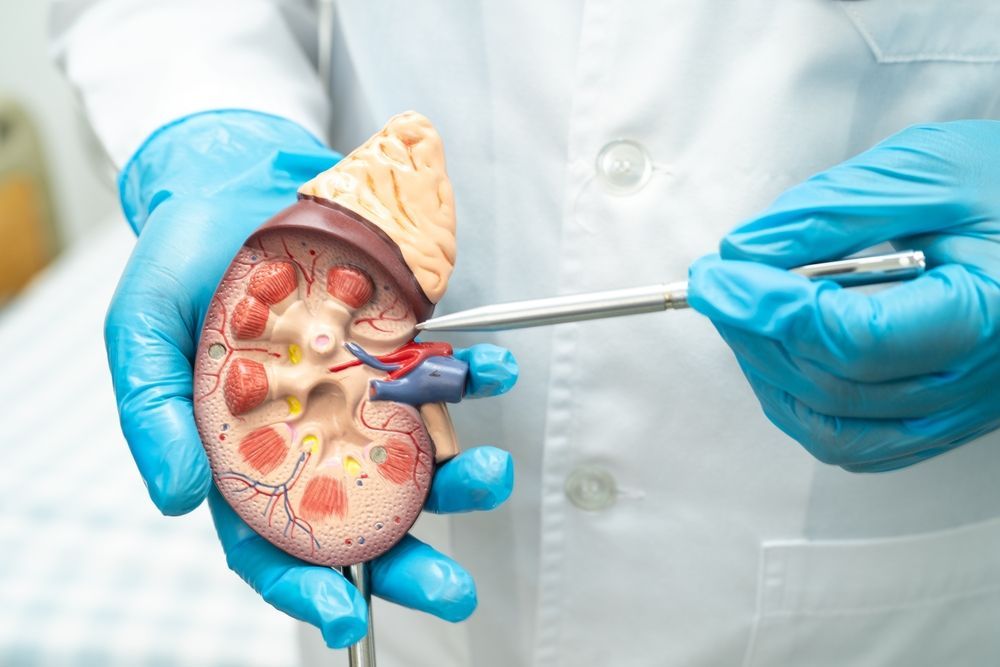What Is a Nephrologist? Understanding Kidney Doctors
Share this Article:
Written by: Vitality Dialysis

Nephrologists are medical doctors who specialize in the diagnosis and treatment of kidney conditions. People manifesting signs of kidney disease or damage or patients with conditions that can negatively affect the kidneys are typically referred to nephrologists by their primary care physicians for specialized kidney care. If you are suffering from chronic kidney disease or any condition that could lead to it, such as diabetes or high blood pressure, you may need to work with a nephrologist to monitor and treat kidney problems.
What is a Nephrologist & What Do They Do?
The term “nephrologist” stems from the Greek words for kidney (nephros) and “a person who studies something” (-ologist). In other words, a nephrologist’s goal is to help people struggling with kidney conditions. Since kidney function can affect and/or be affected by other systems in the body, nephrologists are also fully-trained internal medicine doctors, but with a specialization in kidney health and care.
Understanding Kidney Health with Your Nephrologist
You have two “bean-shaped” kidneys in your body. These organs clean and filter your blood to remove waste products, excess water, and electrolytes, which then get sent out of your body when you urinate. If your kidneys cannot perform this vital function, the results can be life-threatening or even deadly.
If you have signs of chronic kidney disease and dysfunction, your nephrologist will evaluate your lifestyle and medical history and may also order tests to find out what is wrong. These kidney tests typically include blood and urine tests. Your nephrologist may also order a kidney biopsy or genetic tests to uncover the full scope of any kidney health or dysfunction.
After your nephrologist gets to know you and evaluates your medical history, tests, and lifestyle factors, they can diagnose your condition. At that point, you and your nephrologist will work together on a treatment plan to slow or halt kidney disease progression and manage your health. This may include things like better managing other conditions like diabetes or heart disease, making lifestyle adjustments such as lowering salt intake, improving nutrition, or smoking cessation, etc. If you have late-stage chronic kidney disease or are nearing kidney failure, your nephrologist will help you prepare for and receive dialysis.
Nephrology vs Urology
Although nephrology and urology are connected, they are different medical specialties. While a nephrologist specializes in kidney health and care, a urologist specializes in diagnosing and treating conditions related to the urinary system, which includes:
- The kidneys
- The bladder (the organ that collects and stores the urine filtered out by your kidneys through the ureter (a tube connecting the kidneys and bladder) before it is eliminated
- The urethra, which is the tube that eliminates the urine from your bladder
A urologist also specializes in diagnosing and treating issues related to the reproductive organs and the adrenal glands. While there is some overlap in what nephrologists and urologists study, the specializations are still separate. They can both diagnose and treat kidney conditions, however, if your condition is related to kidney function, a nephrologist is the appropriate doctor to see for diagnosis and treatment.
How Do You Become a Nephrologist?
A nephrologist must complete rigorous medical training as any doctor of internal medicine does, but there are additional requirements and training that help them specialize in the anatomy, function, and care of the kidneys. This education and training typically lasts for more than a decade.
Educational Requirements
A nephrologist in the United States must meet the following educational requirements to practice nephrology:
- A four-year degree preparatory to medical school
- A four-year medical school education to earn a DM (Doctor of Medicine) or DO (Doctor of Osteopathic Medicine) degree
- Three years of residency in internal medicine
- Two to three years of fellowship in nephrology
- Optional: An additional year of fellowship in transplant nephrology or interventional nephrology
- This culminates in passing an exam for board certification in nephrology with the American Board of Internal Medicine
Areas of Study
Nephrologists must deeply study everything about kidneys and the conditions and disorders that can affect them. Some critical areas of study include:
1. Glomerular and Vascular Disorders
Glomeruli are clusters of blood vessels that supply the kidneys and aid in the kidneys’ filtering processes. Understanding these vessels can help nephrologists slow down kidney disease progression.
2. Tubular and Interstitial Disorders
Kidney tubules are the structures that collect the fluids and wastes the kidneys filter out of the blood and form part of the conduit that sends these fluids to the bladder as urine. A nephrologist studies these tubules and surrounding tissues so they can diagnose and treat disorders within these structures.
3. Hypertension
Also known as high blood pressure, hypertension is one of the leading causes of chronic kidney disease (CKD). And just as hypertension can damage the kidneys, CKD can actually worsen hypertension. The two conditions are deeply intertwined, so kidney doctors must understand these connections and the medicines and lifestyle aspects that can lower blood pressure to take the stress off of the kidneys while also slowing kidney damage to take pressure off of the cardiovascular system.
4. Dialysis
Dialysis is a life-saving treatment that can take over the kidneys’ blood-cleaning and filtering functions when chronic kidney disease becomes severe or the kidneys fail. Nephrologists become experts in both types of dialysis: hemodialysis and peritoneal dialysis. They also become experts in all the different ways dialysis can be administered so they can help patients get the dialysis treatment that best extends their lives and helps them continue to live and work and get the most out of life while on dialysis.

5. Kidney Transplants
Patients with kidney failure (end-stage renal disease) require dialysis to live until a suitable kidney transplant option becomes available. A kidney transplant involves someone donating a healthy kidney to help a patient replace their damaged ones. Kidney doctors learn in-depth about kidney transplant operations so they can perform them for patients who need this procedure.
6. Mineral Metabolism Disorders
When the kidneys cannot properly filter the blood, excess minerals and wastes can build up to unhealthy levels in the bloodstream. Nephrologists learn about treatments to manage these mineral metabolism disorders so that patients' blood mineral levels remain healthy.
7. Chronic Kidney Disease Management
Chronic kidney disease CKD happens over time in five stages, the last one being failure or end-stage renal disease. Ideally, you and your primary care provider will be able to notice the signs and symptoms of kidney disease before it becomes severe. Nephrologists learn about all the details of the stages of CKD so they can help patients receive treatment and work out lifestyle changes to slow or even halt the progression of CKD for as long as possible.
8. Acute Kidney Failure Management
Acute kidney failure is a condition in which the kidneys suddenly stop working, even if CKD is not the cause. This might entail a traumatic injury, significant blood loss, an infection, or kidney stones. A nephrologist can diagnose and treat patients in these situations to help the kidneys recover if the condition is reversible.
9. Nutritional Interventions
Nutrition plays a major role in overall health, and that includes the kidneys. One aspect of slowing down CKD is working with your nephrologist on a nutrition plan that ensures patients get the right balance of nutrients while avoiding things that can damage the kidneys further, such as excess sodium consumption.
10. Diagnostic Tests and Techniques
Aspiring nephrologists need to know about all the different diagnostic tests and tools used to scan patients for kidney disease and other conditions that affect the kidneys. Some of these diagnostic tests include X-rays, blood tests, urine tests, sonograms, ultrasounds, and others.
Common Conditions Nephrologists Treat
The kidneys perform functions critical to life and the health of many other systems in the body. Nephrologists must become experts in any condition connected to kidney health and function, including:
Diabetes
Diabetes Mellitus (Type 2) is a primary risk factor for developing chronic kidney disease (CKD). A nephrologist should evaluate and monitor your kidney health regularly if you receive a diabetes diagnosis.
Kidney Failure
Kidney failure requires treatment from a nephrologist to save your life. Your kidney doctor will need to prepare you to receive dialysis until a kidney transplant option becomes available for you.
Kidney Stones
A lack of urine volume or an imbalance of minerals can cause hardened mineral deposits to develop in the kidneys or the urinary system.
UTIs
Urinary tract infections (UTIs) can also affect kidney function. A urologist can also treat UTIs.
Kidney Infections
A urinary tract infection (UTI) that worsens can spread via bacteria to infect the kidneys. Nephrologists can treat kidney infections.
Nephrotic Syndrome
Swelling and high protein amounts in urine tests while there are low protein amounts in your blood are symptoms of nephrotic syndrome, which can be a symptom of CKD.
Hyponatremia
The kidneys play a role in the electrolyte levels in your blood. Hyponatremia is a condition in which your blood-sodium amounts are too low, which can be an indication of hormone imbalances, a reaction to medications, or kidney, liver, heart, or even brain diseases.
Common Conditions Nephrologists Treat
Any symptoms of kidney disease or reduced kidney function should be addressed by a nephrologist. Your primary care physician may refer you to see a kidney doctor if you have a genetic predisposition or family history of kidney disease, diabetes, high blood pressure, or any other symptoms or signs of kidney disease, including:
- Changes in your urination habits or characteristics (blood in the urine, frothy pee, darker pee than usual, peeing less or more often than usual)
- Swelling in the extremities or around the eyes
- Brain fog or inability to focus
- Lower back pain

How to Prepare for A Nephrology Appointment
Come to your nephrology appointment with plenty of questions and all of the medical information you need to work together in creating a comprehensive treatment plan for your situation. This includes:
- Filling out necessary forms before the appointment, if possible
- Bring a list of medications that you currently take
- Prepare a list of information your nephrologist should be aware of, including family history, test results, symptoms, surgical history, medical history, and any recent changes to your overall health
- Wear comfortable, easily changeable clothing for any exams or tests
- Insurance information
- Primary care provider information
- Emergency contacts
- A list of any questions you have
Don’t be shy about asking questions about your condition. The nephrologist is there to help and has extensive knowledge about kidney health. It’s also a great idea to bring a family member or close friend with you who can help you take notes or ask additional questions. You should also ask about scheduling follow-up appointments.
If you are dealing with chronic kidney disease and are experiencing the later stages of it or even end-stage kidney failure, discuss all of your options with your nephrologist, including the different types of dialysis that might work best for you. Vitality Dialysis is also a great resource for information about dialysis, so please contact us if you have any questions about how it works or what your next steps should be.
Share with Us!






